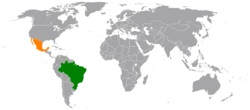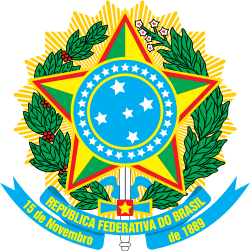Brazil–Mexico relations
 |
|
Brazil |
Mexico |
|---|---|

Brazil–Mexico relations are the diplomatic and bilateral relations between the Federative Republic of Brazil and the United Mexican States. The governments of Brazil and Mexico maintain friendly relations. Together, Brazil and Mexico account as the most populous nations in Latin America and both nations have the largest global emerging economies and are considered to be regional powers.
According to a 2011 BBC World Service Poll, 65% of Mexicans view Brazil's influence positively, with 17% viewing it negatively,[1] and according to a 2013 BBC World Service Poll, 49% of Mexicans view Brazil's influence positively, with 25% viewing it negatively.[2]
Both countries are members of the Community of Latin American and Caribbean States, G-20 major economies, Latin American Integration Association, Organization of American States, Organization of Ibero-American States and the United Nations.
Diplomatic history

Diplomatic relations between Brazil and Mexico were established on 9 March 1825, two years after the declaration of independence of Brazil. In 1831, both nations established resident diplomatic missions in each other's capitals respectively.[3] During the 1860s, both nations were the only Latin-American countries to be governed by monarchs; in Brazil by emperor Pedro II and in Mexico by Emperor Maximilian I; both emperors being cousins.
In 1914, Brazil belonged to regional group called the ABC nations (which also included Argentina and Chile). These three nations made up the richest and most influential nations in South America at the time. That year, the ABC nations intervened in a diplomatic dispute between the United States and Mexico who were on verge of war over the Tampico Affair and the subsequent occupation of Veracruz by US forces. The ABC nations meet with representatives of the United States and Mexico in Niagara Falls, Canada to ease the tension between the two nations and to avoid war, which afterwards did not occur. Between 1910 - 1920, diplomatic relations between both nations were severed during the Mexican revolution. Diplomatic relations were re-reestablished in 1920 when Brazil recognized the new Mexican government.[3] In 1922, diplomatic missions in each other's capitals were upgraded to embassies, respectively.[3]
During World War II, both Brazil and Mexico were the only two Latin American nations to declare war on the Axis powers and to send troops to fight abroad. Brazil sent an expeditionary force to fight in Italy while Mexico sent the 201st Fighter Squadron to fight in the Philippines.
State visits

Presidential visits from Brazil to Mexico[3][4][5][6]
- President João Goulart (1962)
- President Ernesto Geisel (1978)
- President João Figueiredo (1983)
- President José Sarney (1987)
- President Fernando Collor de Mello (1991)
- President Fernando Henrique Cardoso (1996, 1999, 2002)
- President Luiz Inácio Lula da Silva (2007, 2010)
- President Dilma Rousseff (2012, 2015)
Presidential visits from Mexico to Brazil[7]
- President Adolfo López Mateos (1960)
- President Luis Echeverría (1974)
- President José López Portillo (1980)
- President Miguel de la Madrid Hurtado (1984)
- President Carlos Salinas de Gortari (1990, 1993)
- President Ernesto Zedillo (1999)
- President Vicente Fox (2002, 2004)
- President Felipe Calderón (2009)
The environment
Brazil and Mexico worked together, to a certain extent, on climate change issues during the G20 summit in Los Cabos, and the Rio+20 conference, though environmentalist observers called for more.[8]
Trade relations
At a 2009 heads of state conference then Brazilian president Lula da Silva commented that there was "mistrust" between the two countries that needed to be overcome in order to increase trade, which he stated was a goal. He proposed further high-level talks aimed at strengthening ties between the two countries' national oil companies, Petrobras and Pemex. Mexican president Felipe Calderón stated that Mexico wanted to diversify its trade away from over-reliance on the United States and hoped to finish a free trade agreement between the two countries that has been in negotiation since 2000.[9] Shortly after his election in 2012 Mexican president Enrique Peña Nieto criticized cuts to Brazil quotas of imported Mexican-built automobiles, and restated Mexico's interest in a free trade agreement.[10]
In 2014, two-way trade between both nations amounted to $9.2 billion USD.[11]
Resident diplomatic missions
- Brazil has an embassy in Mexico City.[12]
- Mexico has an embassy in Brasília[13] and consulates-general in Rio de Janeiro[14] and São Paulo.[15]
See also
References
- ↑ Views of US Continue to Improve in 2011 BBC Country Rating Poll BBC World Service
- ↑ Views of China and India Slide While UK's Ratings Climb BBC World Service
- 1 2 3 4 Historical diplomatic relations between Mexico and Brazil (in Spanish)
- ↑ Visitas de mandatarios sudamericanos a México (in Spanish)
- ↑ "El Universal - Nación - Llega Lula da Silva en visita de Estado a México". El Universal. 8 October 2015. Retrieved 28 April 2016.
- ↑ Jan Martínez Ahrens (26 May 2015). "EPN Dilma Rousseff: Peña Nieto sobre Brasil: "Es el momento de un nuevo horizonte" - Internacional - EL PAÍS". EL PAÍS. Retrieved 28 April 2016.
- ↑ Las relaciones diplomáticas entre México y Brasil (in Spanish)
- ↑ Reuters Foundation: Can Mexico and Brazil join forces on climate change? Archived November 16, 2012, at the Wayback Machine.
- ↑ "México y Brasil buscan relanzar el TLC". Retrieved 28 April 2016.
- ↑ Reuters Editorial (20 September 2012). "Mexico's next leader wants more trade with Brazil, not less". Reuters India. Retrieved 28 April 2016.
- ↑ "Documento sin título". Retrieved 28 April 2016.
- ↑ Embassy of Brazil in Mexico City (in Portuguese and Spanish)
- ↑ Embassy of Mexico in Brasília (in Portuguese and Spanish)
- ↑ Consulate-General of Mexico in Rio de Janeiro (in Portuguese and Spanish)
- ↑ "Inicio". Retrieved 28 April 2016.

